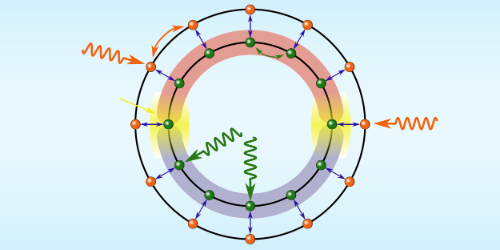Noise Becomes a Quantum Ally
In the quantum world, noise is usually seen as disruptive, interfering with delicate quantum states and making it hard for particles to remain coherent or entangled. But now, Giuliano Chiriacò at the University of Catania, Italy, and his colleagues have identified and explored a scenario in which noise protects and even enhances entanglement [1]. This counterintuitive discovery could inspire methods of exploiting noise to improve the performance of quantum devices, the researchers say.
Chiriacò and his colleagues considered a system that comprises two chains of fermions, such as electrons. Each of these chains, called the system chain and the ancilla chain, is subjected to its own independent noise. Fermion–fermion couplings within each chain and between the two chains can cause different fermions to become entangled. Using extensive numerical simulations, the researchers studied this entanglement under various conditions. They found that, when the quantum state of the ancilla chain evolves faster than that of the system chain, strong noise acting on the former can shield and even boost entanglement in the latter. This behavior occurs for a wide range of chain sizes and noise parameters.
On the basis of their simulation results, Chiriacò and his colleagues propose that this noise-assisted entanglement stems from an altered interplay between coherence and decoherence in the coupled chains. They suggest that this change is driven by the combination of strong noise and fast evolution in the ancilla chain. The researchers say that their work could provide an approach for mitigating errors in quantum computers that, unlike conventional techniques, requires no extra quantum bits and can be implemented on existing platforms.
–Ryan Wilkinson
Ryan Wilkinson is a Corresponding Editor for Physics Magazine based in Durham, UK.
References
- C. Muzzi et al., “Entanglement enhancement induced by noise in inhomogeneously monitored systems,” Phys. Rev. B 111, 014312 (2025).




